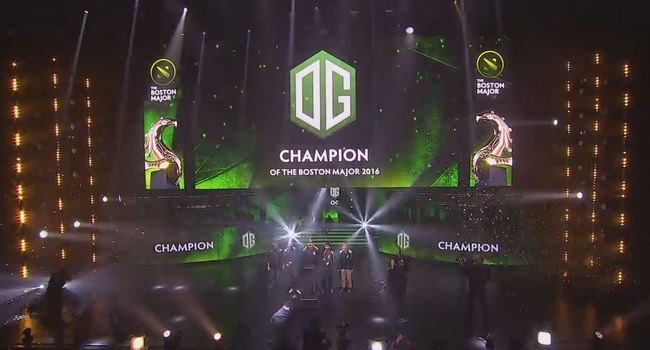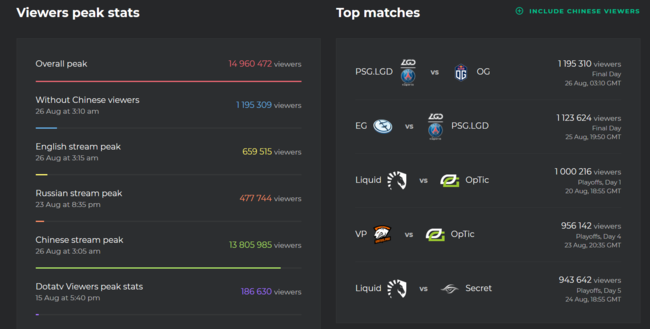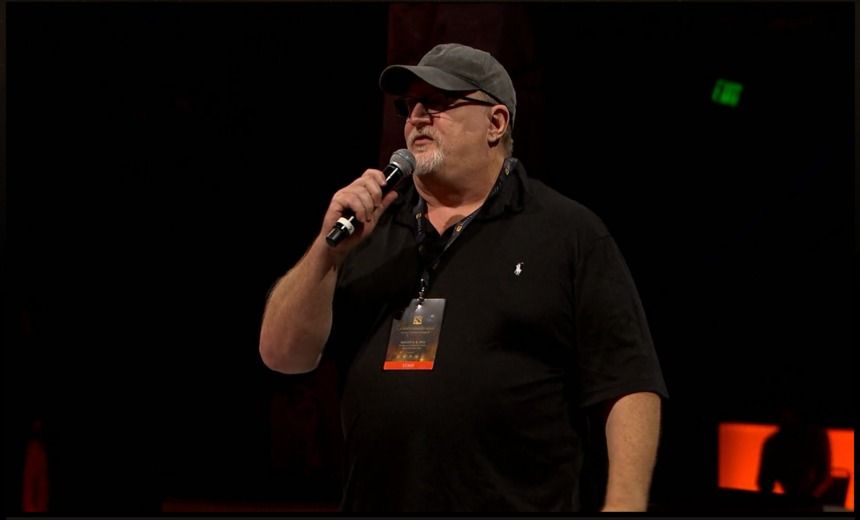Valve was arguably one series away from being victims of an astronomical outcry from prospective Dota 2 players and fans within the North American region.
Valve was already on the hot seat with NA Dota 2 fans and prospective players after a blatant deprivation of events held in NA, made worse by moving TI9 outside of the region. A compLexity Gaming victory could have potentially caused the situation to reach a boiling point. Before we delve into the compLexity Gaming controversy, let’s examine the events leading up to this point.
Valve sanctioned events in NA
Valve has clearly been migrating away from holding events in the NA region. For the purposes of this article, the inception of the modern major system will be defined as starting with The Frankfurt Major 2015.
According to Liquipedia, since the beginning of the modern major system, there has been a total of 36 valve sanctioned events. Locations of these events are as follows; NA with 6, SA with 0, SEA with 5, EU with 12, China with 8, CiS with 5. Looking at these numbers alone, it’s evident that SA suffers the most of any region in terms of events. However, the trend indicates that NA will now share the same reality.

Many argue that because NA historically hosts the most prestigious tournament in all of competitive gaming, no one in the region has the right to complain about the lack of Valve sanctioned events. Now that The International has effectively been moved outside of the region, that nonsense can be dropped.
When removing the three Internationals from the list of events held in NA, you’re left with a single major and two minors. One of these minors was Captain’s Draft mode which, sorry, can hardly be compared to a full hero draft. Why this was even allowed to be an official minor is baffling, but that’s a different topic altogether.
The first season of majors provided the NA region with The Boston Major 2016 and TI7. The second season, and first Dota Pro Circuit (DPC), provided the NA region with Captains Draft 4.0, Dota Summit 8 and TI8. The third and current season provides the NA region with not one major, minor or even The International. That’s not one valve sanctioned event in all of NA and SA for the second DPC period.
As a fan, this inevitably means not having the luxury of watching the event live unless there’s no need for a viewer to work or maybe the viewer has a schedule which enables them to do so. Speaking from personal experience, it’s quite deflating to rarely be able to watch an event live and this trend is not reassuring any hopes for change.
As a player, there’s bound to be certain advantages for those not required to experience extreme time zone changes. Every player must adjust based on location of the event, but one must imagine that the effect on players from NA and SA are particularly stressful due to simple geography. There may be other factors as well like general health concerns that come with being in areas which the body’s system is not accustomed to.
Risks for events outside NA
Every region and the countries therein provide risks to Valve when choosing to sanction an event. The most current risk which has drawn the ire of many in the Dota 2 community is a political risk.
In early 2018, Valve rescinded Galaxy Battles II: Emerging Worlds’ major status, citing regulations for esports players entering the Philippines as the motivator for the judgment.
Most recently is Valve’s decision to ban Carlo ‘Kuku’ Palad from participating in The Chongqing Major over racially charged remarks directed toward China and subsequent attempts by TNC Predator to cover up the transgression. Valve also made it absolutely clear in the statement that the player was not banned by the Chinese government. On top of that, we’ve learned that reports indicate that Carlo Palad will not be able to attend WESG which is also held in Chongqing. WESG issued a statement which says that Carlo Palad was in fact banned by the local government in China and will not be able to attend WESG. This has created a shroud of uncertainty for him to even appear at TI9 as the event is hosted in Shanghai.
Incentives for Valve to hold events outside NA
At first glance, it may seem like Valve lied about the ban from The Chongqing Major coming from the Chinese government. Valve is technically the entity which banned the player. However, to assume that Valve’s decision came with no pressure from China either indirectly or directly is just naïve. This means that Valve was being manipulative in their wording at the very least.
China represents a huge market for Valve. Here is a statistic for perspective. According to Esports Charts, the overall stream peak of TI8 was 14,960,472 viewers. Contributing to that total, China’s largest stream peak was 13,805,985 viewers. Granted, it’s impossible to verify the accuracy of the viewer count due to the almost certain existence of view bots which inflate those numbers, but that is a substantial percentage of the overall stream peak. It is in Valve’s best interest not to alienate those viewers. What needs to be emphasized is that these political risks exist and they create serious issues which can be avoided by sanctioning events which are held elsewhere. The situation has evolved into a publicity nightmare for Valve. Both of these instances are a far cry from any issues encountered for a NA hosted event.

Valve's inconsistencies in NA
You may recall that back in November, Test123 was disqualified from attending the Chongqing Major after qualifying within the SA region. The decision was made due to the fact that 4/5 of the players were American, the team was no longer sponsored by a South American Team and not living in the region.
Without a doubt, no one is going to question Valve’s decision in this instance. Not even the players on Test123 blame Valve for the decision. Quinn ‘CCnC’ Callahan, the mid-player for the team, illustrated this in a detailed post and to explain the team’s circumstances leading up to the qualifiers. It’s highly recommended to at least skim through this post for context.
To make a long story short, reality has a way of slapping people in the face, and the fact is some teams do not have the same resources as larger organizations. When changes need to be made and limited resources already spent on boot camp and hotels, you have to roll with the punches. Team123 rolled with those punches, made difficult decisions, qualified for the major, were subsequently disqualified from the major and then Quinn Callahan accepted the punishment without blaming Valve even though it meant not attending a major. This was a selfless and mature act by a young, promising gamer.
That historical reminder brings us back to the present. As many may already know, compLexity Gaming had a serious problem procuring a work visa for Adam ‘343’ Shah. This caused them to utilize Jaron ‘monkeys-forever’ Clinton as a stand-in for the DreamLeague Season 11 Major. What made many prospective players angry is the fact that compLexity Gaming has just one player from the NA region on the official roster. This was pointed out by Grant ‘GranDGranT’ Harris in a series of tweets.
It is universally accepted that players from different regions can compete within others if they have a work visa available and spend significant amount of time in the region to boot camp as well as make other preparations for qualifiers. However, as Grant illustrates, three of the players were in SEA during the lead up to the qualifiers, according to DOTABUFF. Kyle ‘Beef’ Bautista responded to the tweet to argue that due to the recent government shutdown and a severely slowed process, there was difficulty getting U.S. work visas for their players. Their inability to get Adam into the NA region forced coL to send their players to SEA to boot camp for the qualifiers. Additionally, when it seemed like they would not get these visas in time, they notified Valve and DreamHack.
While the circumstances are unfortunate, there cannot be any ambiguity in the standards for being able to compete in a region. If coL was forced to boot camp in SEA then they should have been competing in SEA qualifiers. Once the visa issues were resolved then the team would be welcome to return to the NA region to play in qualifiers. This would be consistent with today’s standards. Exceptions cannot be made for certain teams just because there exists an organization offering them additional resources. If Valve was going to make a ruling on the situation, it likely would have come after the conclusion of the qualifiers, like it did for Test123. Fortunately for Valve, no decision needed to be made as coL failed to qualify for the major or minor. However, this issue needs to be addressed because a healthy amount of anger from prospective NA players has surfaced. In this circumstance, it seems warranted.
NA's hard truth
Valve is a business, needs to generate revenue and gifted us this extraordinary game. There are no words to express how appreciative players, who played the DOTA custom game in Warcraft III, are of Valve. That includes this writer.
In addition to this, Valve must have determined that sanctioning events in the regions they have is most conducive for their bottom line. Consequently, they are reserved every right to make decisions which are financially beneficial. However, let’s not also afford them the luxury of this while claiming to be nurturing every region when evidence suggests the contrary. That would be disingenuous, intellectually dishonest and downright hypocritical.

